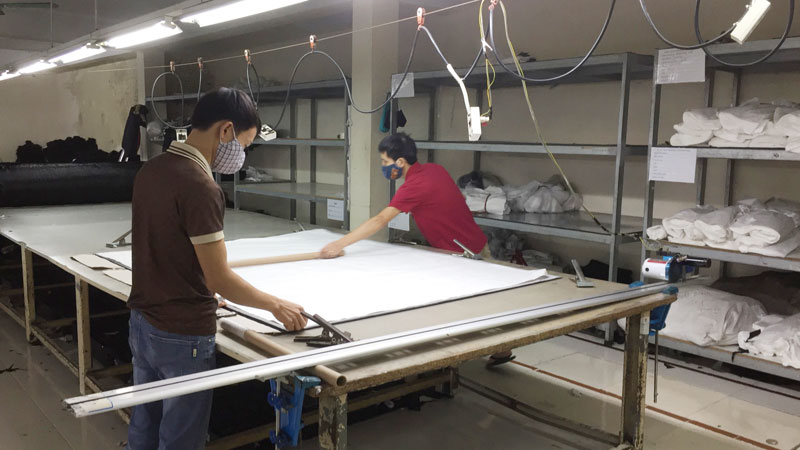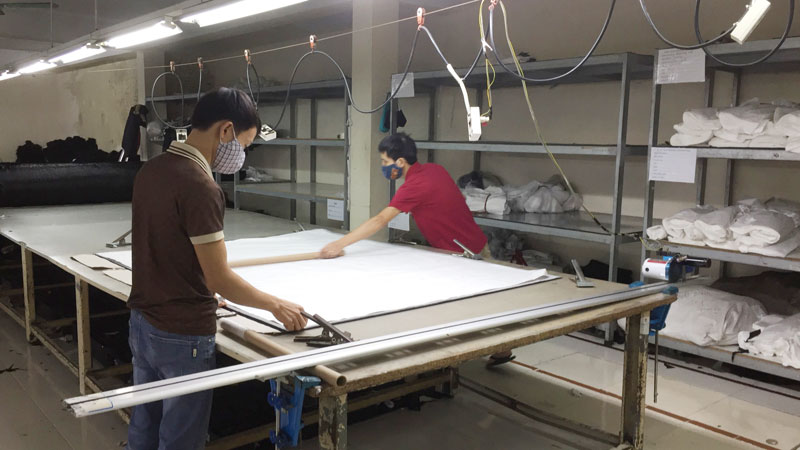
(HBO) - Over the past years, the Party Committee and People’s Committee of Hoa Binh province have rolled out many solutions to support the private economic sector, contributing to the renewal process and socio-economic development in the locality.
 SMA Vina Viet-Han
Garment Import-Export Co. in Dan Chu ward, Hoa Binh city, has generated jobs
for many local labourers.
SMA Vina Viet-Han
Garment Import-Export Co. in Dan Chu ward, Hoa Binh city, has generated jobs
for many local labourers.
Hoa
Binh province has paid attention to improving the local business environment
and removing barriers hindering the development of the private economic sector.
The
provincial Party Committee and People’s Committee have instructed departments,
agencies and localities to regularly review administrative procedures relating
to investment, construction, land and business registration.
In
addition, the local tax sector has maintained online tax declarations and
payments and reduced overlapping inspections.
Local
departments and agencies have frequently provided updates on administrative
procedures at public administrative service centres, offices and websites,
making it easier for organisations, individuals and businesses to access
information.
Over
the past five years, Hoa Binh attracted 284 projects with total registered
capital of nearly 48 trillion VND (2.07 billion USD), including 17 foreign
direct investment (FDI) projects worth 275.7 million USD.
Local
industrial parks now accommodate 96 projects, with 25 FDI projects valued at
539.47 million USD and 71 domestic projects worth nearly 7.39 trillion VND. As
many 60 projects have been put into operation, creating jobs for nearly 19,800
labourers.
There
are 2,100 newly-registered firms with combined capital of 30 trillion VND and
34,000 household businesses. Hoa Binh province has encouraged eligible
households to transform themselves into enterprises./.
According to data from the Hoa Binh Provincial Party Committee, the industrial production index for the first six months of 2025 is estimated to have increased by 20% compared to the same period last year. This marks the highest year-on-year growth rate for this period since 2020.
In the first six months of 2025, Hoa Binh province’s export turnover was estimated at 1.145 billion USD, marking an 18.11% increase compared to the same period in 2024. Import turnover was estimated at $ 804 million, a 17.15% increase, which helped the province maintain a positive trade balance.
The lives of the ethnic minority farmers in Tan Lac district have gradually improved thanks to the new directions in agricultural production. This is a testament to the collective strength fostered through the professional associations and groups implemented by various levels of the district’s Farmers’ Union.
With the motto the "product quality comes first,” after nearly one year of establishment and operation, Muong village’s Clean Food Agricultural and Commercial Cooperative, located in Cau Hamlet, Hung Son Commune (Kim Boi district), has launched reputable, high-quality agricultural products to the market that are well-received by consumers. The products such as Muong village’s pork sausage, salt-cured chicken, and salt-cured pork hocks have gradually carved out a place in the market and they are on the path to obtaining the OCOP certification.
In the past, the phrase "bumper harvest, rock-bottom prices" was a familiar refrain for Vietnamese farmers engaged in fragmented, small-scale agriculture. But today, a new spirit is emerging across rural areas of Hoa Binh province - one of collaboration, organisation, and collective economic models that provide a stable foundation for production.
Maintaining growing area codes and packing facility codes in accordance with regulations is a mandatory requirement for agricultural products to be eligible for export. Recently, the Department of Agriculture and Environment of Hoa Binh province has intensified technical supervision of designated farming areas and packing facilities to safeguard the "green passport" that enables its products to access international markets.



 SMA Vina Viet-Han
Garment Import-Export Co. in Dan Chu ward, Hoa Binh city, has generated jobs
for many local labourers.
SMA Vina Viet-Han
Garment Import-Export Co. in Dan Chu ward, Hoa Binh city, has generated jobs
for many local labourers.